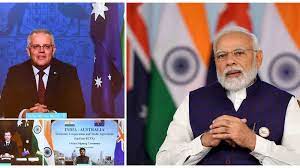Australia-India Economic Cooperation And Trade Agreement:

An Australian parliamentary committee on treaties has recommended to its government to ratify the Australia-India Economic Cooperation and Trade Agreement (AI-ECTA).
- AI-ECTA needs ratification by the Australian parliament before its implementation. In India, such pacts are approved by the Union Cabinet.
- The agreement, once implemented, will provide duty-free access to the Australian market for over 6,000 broad sectors of India, including textiles, leather, furniture, jewellery and machinery.
- Under the pact, Australia is offering zero-duty access to India for about 96.4% of exports (by value) from day one.
- This covers many products that currently attract 4-5% customs duty in Australia.
- India’s goods exports stood at USD 8.3 billion and imports aggregated to USD 16.75 billion in 2021-22.
- The agreement would help in taking bilateral trade from USD 27.5 billion at present to USD 45-50 billion in the next five years.
- The Agreement inter-alia covers areas like Trade in Goods, Rules of Origin, Trade in Services, Technical Barriers to Trade (TBT), Sanitary and Phytosanitary (SPS) measures.
- Rules of origin are the criteria needed to determine the national source of a product.
- Their importance is derived from the fact that duties and restrictions in several cases depend upon the source of imports.
- The General Agreement on Tariffs and Trade (GATT) has no specific rules governing the determination of the country of origin of goods in international commerce. Each contracting party was free to determine its own origin rules, and could even maintain several different rules of origin depending on the purpose of the particular regulation.




